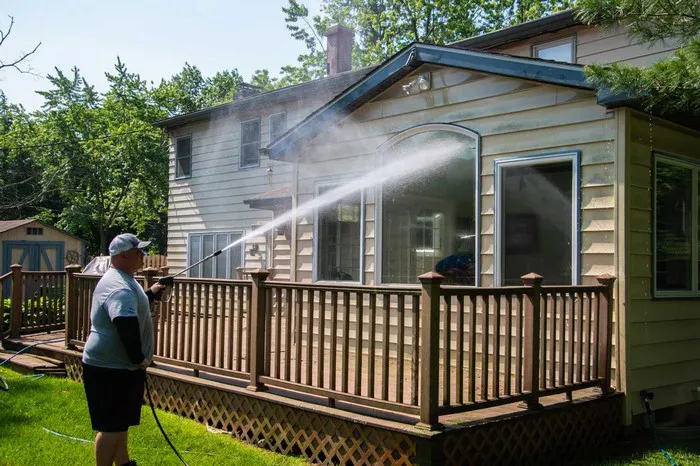Bleach is a powerful cleaning agent that many homeowners turn to for tackling tough stains and mold on various surfaces around their homes. When it comes to pressure washing, using bleach can be an effective way to achieve a deep clean. However, there are certain precautions and guidelines to follow to ensure safe and effective use. In this guide, we’ll explore the dos and don’ts of using bleach in your pressure washer.
Understanding Bleach and Its Uses
Bleach is a chemical compound that is widely used as a disinfectant and whitening agent. It is commonly used for cleaning and sanitizing surfaces in households, commercial spaces, and industrial settings. There are different types of bleach available, including chlorine bleach (sodium hypochlorite) and oxygen bleach (hydrogen peroxide).
Can You Use Bleach in Your Pressure Washer?
Yes, you can use bleach in your pressure washer, but it’s essential to do so safely and correctly. Bleach can be effective in removing mold, mildew, algae, and other tough stains from surfaces such as decks, siding, driveways, and fences. However, it’s crucial to dilute the bleach properly and avoid using it on delicate surfaces or near plants and vegetation.
How to Use Bleach Safely in Your Pressure Washer
1. Prepare the Solution: Start by diluting the bleach according to the manufacturer’s instructions. Typically, a ratio of one part bleach to four parts water is suitable for most cleaning tasks. Mix the solution thoroughly before pouring it into the pressure washer’s detergent tank.
2. Protective Gear: Before starting the pressure washer, put on protective gear, including goggles, gloves, and long sleeves, to prevent skin and eye irritation.
3. Test Spot: Before applying the bleach solution to the entire surface, test a small, inconspicuous area to ensure that it doesn’t cause any damage or discoloration.
4. Application: Adjust the pressure washer nozzle to a low-pressure setting to prevent damage to the surface. Apply the bleach solution evenly to the surface, working from the bottom up to avoid streaking.
5. Dwell Time: Allow the bleach solution to sit on the surface for 5-10 minutes to penetrate and loosen the stains.
6. Rinse: After the dwell time, rinse the surface thoroughly with clean water using the pressure washer.
7. Final Rinse: To neutralize any remaining bleach residue, rinse the surface again with a solution of water and vinegar or a commercial neutralizer.
8. Cleanup: Once you’ve finished cleaning, empty the detergent tank and flush the pressure washer with clean water to remove any remaining bleach solution.
Advantages of Using Bleach in Your Pressure Washer
1. Effective Stain Removal: Bleach is highly effective at removing tough stains, mold, and mildew from surfaces.
2. Disinfection: Bleach has strong disinfectant properties, making it ideal for killing bacteria, viruses, and other pathogens.
Whitening: Bleach can help restore the brightness of surfaces by removing stains and discoloration.
3. Cost-Effective: Bleach is relatively inexpensive compared to some commercial cleaning products, making it a cost-effective cleaning solution.
Disadvantages of Using Bleach in Your Pressure Washer
1. Corrosive: Bleach can be corrosive to certain surfaces, especially if used in high concentrations or left on for too long.
2. Environmental Impact: Bleach can be harmful to the environment if not used responsibly, as it can contaminate waterways and harm aquatic life.
3. Health Risks: Bleach can cause skin and eye irritation, as well as respiratory issues if inhaled in high concentrations.
4. Damage to Plants: Bleach can kill plants and damage vegetation if not used carefully, so it’s essential to avoid overspray and runoff.
Cost Considerations
The cost of using bleach in your pressure washer will depend on factors such as the price of bleach, water, and any additional cleaning agents or neutralizers you may need. However, compared to professional cleaning services or specialized cleaning products, using bleach is generally a more cost-effective option for homeowners.
Conclusion
Using bleach in your pressure washer can be an effective way to remove tough stains and disinfect surfaces around your home. However, it’s crucial to use bleach safely and responsibly to avoid damage to surfaces, harm to the environment, and risks to health. By following proper dilution ratios, using protective gear, and taking precautions, you can achieve clean, bright results without compromising safety.
FAQs
Q1: Can I use bleach in my pressure washer to clean my roof?
A1: While bleach can be effective at removing mold and algae from roofs, it’s essential to use caution. Avoid using high concentrations of bleach, as it can damage roofing materials and pose a risk to nearby vegetation. It’s best to consult a professional or follow manufacturer guidelines for safe roof cleaning practices.
Q2: Is it safe to use bleach in a pressure washer indoors?
A2: Using bleach indoors with a pressure washer can be risky due to the potential for fumes and overspray. If indoor cleaning is necessary, ensure proper ventilation and take precautions to protect surfaces and belongings from bleach exposure. Additionally, consider using alternative cleaning solutions that are less harsh and safer for indoor use.
Q3: Can I use bleach in my pressure washer to clean my car?
A3: While bleach can be effective at removing stains from hard surfaces, it’s not recommended for cleaning cars. Bleach can damage paint, trim, and other car surfaces, leading to discoloration and deterioration. Instead, use automotive-specific cleaning products that are formulated to safely clean and protect your vehicle’s exterior.

